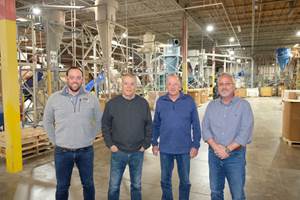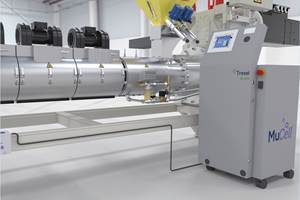Global Company, Local Creativity
Magna International, Inc. may be a global Tier One automotive parts supplier with over 220 manufacturing divisions and more than 82,000 employees, but it doesn’t stifle creativity at the individual plant level.
Magna International, Inc. may be a global Tier One automotive parts supplier with over 220 manufacturing divisions and more than 82,000 employees, but it doesn’t stifle creativity at the individual plant level. Its website states, “Magna has embraced entrepreneurial principles of decentralization. Each manufacturing facility operates as an independent, product-oriented center, which provides management with a high degree of autonomy, resulting in sensitive focus and rapid response to changes in customer needs and market conditions.”
A good example of what those high-sounding words mean in action can be seen at Magna Intier’s Eybl plant in Ebergassing, Austria. It responded to a German car maker’s need to control rising resin costs by creating an unusual closed-loop recycling system. Intier reprocesses multi-material scrap from the car maker’s carpet-covered PP parts back into specific carpeted interior parts. Black trunk floors were chosen, not security parts like airbag covers, notes Gebhard Bitterhof, the plant’s managing director, who backed the recycling development.
The scrap is rigid PP covered with carpet of nylon 66 fibers and a polyester fleece. The typical solution for reusing such mixed-material automotive scrap would be to grind it up, separate the components, and recover the largest fraction for reuse in a less visible part like wheel wells.
Two bold moves
Eybl initially tried to recover only the PP substrate. Intier ground the scrap and sent it out to commercial recyclers in southern Germany and Austria for separation of the components and then sent the PP to a toll compounder for repelletizing. But the transportation cost was too high, and the carpet and fleece fraction still had to be disposed of. Also, the Ebergassing plant couldn’t be absolutely sure it was getting only its own material back—which was essential for quality control.
Intier solved all three problems with two bold moves—taking the recycling in-house and eliminating the separation step. After extensive testing, Intier bought a Coax reclaim extruder from Erema GmbH in nearby Linz, Austria (U.S. office in Ipswich, Mass.). The Coax system, which has a single shaft turning both shredder and screw, is designed to compact and re-extrude low-bulk-density reclaim like textile and carpet scrap. With a custom mixing screw designed to combine the nylon and PP, it was able to handle the combination of shredded carpet and rigid PP. The mixture extrudes at 536 F in order to melt the nylon without burning the PP. The melt is then filtered and underwater pelletized.
While Intier’s recycling line was being built, Erema processed the carpeted reclaim for Intier so that the car maker could validate the utility of the recovered blend for new parts. The reclaim is now qualified for use at up to 20% in carpeted trunk floors on three vehicle models. Although the presence of nylon in the recycled resin reduces its shrinkage, new tooling was not required in most cases because up to 20% recycle content didn’t change part dimensions significantly.
MFR is a little lower with the nylon content, so flow is tested for every ton of recycle. MFR of 100% virgin PP is 20 to 25 g/10 min. With 20% recycle content, MFR drops to 15 to 20, which is not enough to affect molding cycle time. And the reclaim level can be lower since scrap rates are as low as 2% in some months. Mixed-material recycle is also stored in blending silos to ensure good homogeneity.
The recycling program has been running for over a year. The Erema line runs one shift five days a week. The program saves disposal of 700,000 lb/yr of scrap and the purchase of close to that amount of virgin material. As a tribute to the success of this independent recycling effort, in-house mixed-material recycling will be extended to two other Intier plants.
Related Content
Optical Sorting for Color Flexibility in Recycled Plastics
Aaron Industries added optical sorting to its operation, expanding capabilities to meet the color needs of customers.
Read MoreEvolving Opportunities for Ambitious Plastics Recycler
St. Joseph Plastics grew from a simple grinding operation and now pursues growing markets in recycled PP, food-grade recycled materials, and customized post-industrial and post-consumer compounds.
Read MoreFoam-Core Multilayer Blow Molding: How It’s Done
Learn here how to take advantage of new lightweighting and recycle utilization opportunities in consumer packaging, thanks to a collaboration of leaders in microcellular foaming and multilayer head design.
Read MoreNPE2024 Wrap-Up: Sustainability Dominates Show Floor News
Across all process types, sustainability was a big theme at NPE2024. But there was plenty to see in automation and artificial intelligence as well.
Read MoreRead Next
Beyond Prototypes: 8 Ways the Plastics Industry Is Using 3D Printing
Plastics processors are finding applications for 3D printing around the plant and across the supply chain. Here are 8 examples to look for at NPE2024.
Read MorePeople 4.0 – How to Get Buy-In from Your Staff for Industry 4.0 Systems
Implementing a production monitoring system as the foundation of a ‘smart factory’ is about integrating people with new technology as much as it is about integrating machines and computers. Here are tips from a company that has gone through the process.
Read More



















